Imran Khan
Imran Ahmad Khan Niazi, gained fame as a cricket player, leading Pakistan to a 1992 Cricket World Cup victory. As Pakistan’s prime minister from 2018 to 2022, he faced both acclaim and controversy
About Imran Khan :
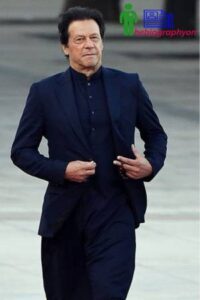
Born name Imran Ahmad Khan Niazi
5 October 1952 (age 71)
Lahore, West Punjab, Pakistan
(present-day Punjab, Pakistan)
Political party Pakistan Tehreek-e-Insaf (since 1996)
Spouses
Jemima Goldsmith
(m. 1995; div. 2004)
Reham Khan
(m. 2015; div. 2015)
Bushra Bibi
(m. 2018)
Children Sulaiman Isa Khan
Kasim Khan
Parents
Ikramullah Khan Niazi (father)
Shaukat Khanum (mother)
Relatives Family of Imran Khan
Residences
Bani Gala, Islamabad, Capital Territory
Zaman Park, Lahore, Punjab
Education Keble College, Oxford (BA)
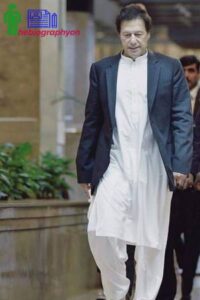
Personal information
Height 6 ft 2 in (188 cm)[1]
In Cricket :
Batting Right-handed
Bowling Right-arm fast
Role All-rounder
In Politics :
22nd Prime Minister of Pakistan
18 August 2018 – 10 April 2022
Early life and family
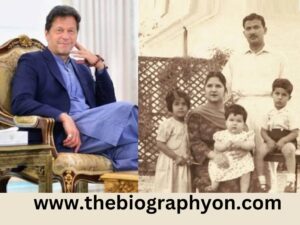
Imran Khan, the former Prime Minister of Pakistan and legendary cricket captain, was born on October 5, 1952, in Lahore. His family’s legacy extends beyond sports, making them a prominent force in both politics and athletics.
- Early Life:
- Imran Khan grew up as the only sonin the family, surrounded by four sisters. His father, Ikramullah Khan Niazi, was a civil engineer, and his mother, Shaukat Khanum, hailed from the Burki Pashtun tribe settled in Jalandhar, Punjab. The maternal lineage produced several great cricketers, including Javed Burki and Majid Khan.
- Paternally, Khan belongs to the Niazi Pashtun tribe, which has long been settled in Mianwali, in northwestern Punjab.
Imran Khan’s life is a fascinating blend of cricketing glory, political leadership, and personal relationships. His impact on Pakistan’s history and culture remains indelible
Personal life
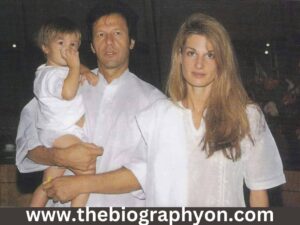
Imran Khan, the iconic cricketer-turned-politician, has led a life marked by both triumphs and personal challenges. Here’s a concise glimpse into his personal journey:
- Marriages and Family:
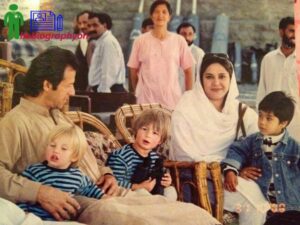
Imran Khan his wife & kids - Jemima Goldsmith: In 1995, Imran Khan married Jemima Goldsmith, an English socialite. Their union blended cultures, as Jemima converted to Islam before their traditional Islamic ceremony in Paris. They have two sons: Sulaiman Isa(born in 1996) and Kasim (born in 1999). Despite their love, the marriage ended in divorce in 2004.
- Reham Khan: Imran’s second marriage was to Reham Khan, a British Pakistani journalist, in 2015. Unfortunately, this union was short-lived, lasting only nine months.
- Bushra Bibi: In 2018, Imran Khan married Bushra Bibi, who had previously been his spiritual mentor.
- Legacy and Influence:

Imran Khan with his family - Imran Khan’s personal life, including his happy childhood in Lahore, his education at Keble College, Oxford, and his extraordinary cricketing career, has significantly shaped his philanthropic and political endeavors.
- His legacy extends beyond cricket, as he became the 22nd Prime Minister of Pakistanin 2018, leading the nation through a transformative period.
Imran Khan’s journey reflects resilience, passion, and a commitment to making a difference in Pakistan’s history 123.
Cricket career
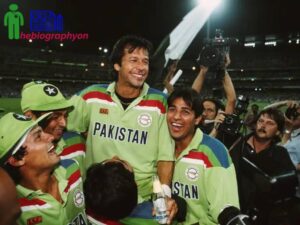
Imran Khan, the legendary cricketer and former Prime Minister of Pakistan, left an indelible mark on the world of cricket. Born on October 5, 1952, in Lahore, Khan’s journey from the cricket pitch to political leadership is nothing short of remarkable.
- Early Career and Rise:
- Imran Khan made his international debut in a 1971 Test series against England. His lithe bounding run, graceful leap, and reverse-swinging yorker made him an instant sensation.
- As captain, he led Pakistan to their first-ever Cricket World Cup victory in 1992, a historic achievement etched in sporting history.
- All-Rounder Extraordinaire:
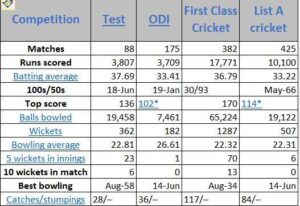
Imran Khan’s Cricket Career - Khan’s versatility extended beyond his captaincy. He transformed himself into an all-rounder, earning a place for his batting prowess alone.
- His averages of 37 with the batand 22 with the ball placed him at the pinnacle of allrounders in the 1980s, alongside Ian Botham, Richard Hadlee, and Kapil Dev.
- Unyielding Battles with West Indies:
- While others struggled against the formidable West Indies, Khan’s Pakistan drew three series with them. His fierce determination and skillful leadership stood out.
- In 1987, he orchestrated Pakistan’s historic series victory in England, taking 10 wickets for 77 runsin a commanding display at Headingley.
- Late-Career Brilliance:
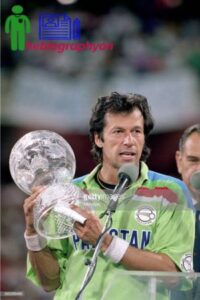
Imran Khan with World Cup - Unlike some contemporaries, Khan’s prowess only grew with time. In his last decade of international cricket, he played 51 Tests, averaging a sensational 50 with the batand 19 with the ball.
- His impact extended beyond the field. His marriage to socialite Jemima Goldsmithand subsequent foray into Pakistan’s intricate political landscape kept him in the spotlight.
Political Career
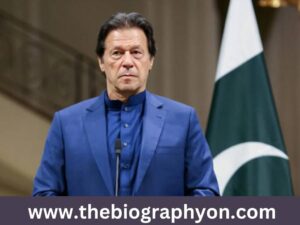
Imran Khan, born on October 5, 1952 in Lahore, Pakistan, is a multifaceted figure who transitioned from cricketing glory to political leadership. Let’s delve into the intriguing chapters of his political career:
- Founding Pakistan Tehreek-e-Insaf (PTI):
- In the mid-1990s, Khan embarked on his political journey by founding the Pakistan Tehreek-e-Insaf (PTI)in 1996. His party aimed to challenge the established political order and fight against corruption.
- The Shaukat Khanum Cancer Hospital, established in memory of his mother, became a testament to his commitment to public welfare.
- Support and Opposition:
- Initially, Khan supported President Pervez Musharraffrom 1999. However, his views evolved, and he eventually opposed Musharraf’s regime.
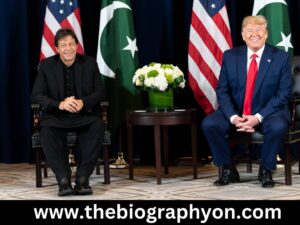
Imran Khan with US president Donald Trump - His political trajectory was marked by both acclaim and controversy.
- Initially, Khan supported President Pervez Musharraffrom 1999. However, his views evolved, and he eventually opposed Musharraf’s regime.
- Prime Ministerial Stint:
- In 2018, Khan achieved a historic milestone by becoming the 22nd Prime Minister of Pakistan. His tenure lasted until April 2022.
- His leadership focused on economic reforms, social justice, and anti-corruption measures.
- Challenges and Achievements:
- Khan faced challenges, including corruption chargesleveled against him in 2022. His clash with the politically influential army added complexity to his premiership.
- Despite the hurdles, his legacy remains intertwined with Pakistan’s political landscape.
2018 general election

In the 2018 Pakistani general election, held on July 25, 2018, Imran Khan’s Pakistan Tehreek-e-Insaf (PTI) emerged as a major contender. The three key parties were PTI (led by Khan), the Pakistan Muslim League (PML-N) led by Shehbaz Sharif, and the Pakistan Peoples Party (PPP) led by Bilawal Bhutto.
- Election Outcome:
- The PTI secured the most seats in the National Assemblybut fell short of a majority.
- At the provincial level:
- PTI remained the largest party in Khyber Pakhtunkhwa (KP).
- PPP retained dominance in Sindh.
- The newly formed Balochistan Awami Party (BAP)emerged as the largest party in Balochistan.
- In Punjab, the result was a hung parliament, with PML-N initially winning the most seats.
- Challenges and Controversies:
- Rumors circulated about pre-poll rigging by the judiciary, military, and intelligence agencies favoring PTI over PML-N.
- Despite setbacks, Khan’s PTI secured 32% of the vote, forming a coalition government with smaller parties.
Imran Khan’s victory marked a pivotal moment in Pakistan’s political landscape
Victory speech
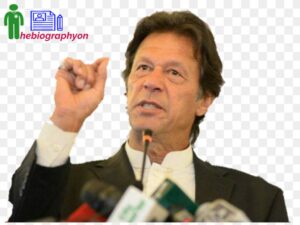
Amid his triumph discourse, he laid out the arrangement traces for his future government. Khan said his motivation is to construct Pakistan as a helpful state based on standards of the primary Islamic state of Medina. He depicted that his future government will put the destitute and commoners of the nation to begin with and all approaches will be adapted towards raising the measures of living of the lesser blessed. He guaranteed an examination into fixing affirmations. He said that he needed a joined together Pakistan and would abstain from victimizing his political adversaries. Everybody would be break even with beneath the law. He guaranteed a straightforward and less exorbitant government, void of garish vainglory in which the prime minister’s house will be changed over into an instructive founded and representative houses will be utilized for open benefit.On remote approach, he lauded China and trusted to have superior relations with Afghanistan, Joined together States, and India. On Center East, he said his government will endeavor to have a adjusted relationship with Saudi Arabia and Iran.
Prime Minister of Pakistan
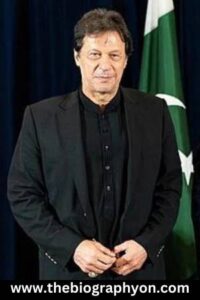
Imran Khan, the former cricket star turned politician, assumed the role of Pakistan’s 22nd Prime Minister on August 18, 2018. His journey from the cricket field to the political arena was marked by anticipation and high expectations. Let’s delve into the significant aspects of his prime ministership:
- Inaugural Address:
- On August 19, 2018, Imran Khan addressed the nation formally via television, outlining his vision for Pakistan. This address set the tone for his premiership, emphasizing key priorities and challenges.
- The 100-Day Agenda:
- During the 2018 Pakistani general election, Khan’s party, Pakistan Tehreek-e-Insaf (PTI), had unveiled an ambitious “100-day agenda”. This plan aimed to achieve several critical objectives:
- Southern Punjab Province: The creation of a new province in Southern Punjab was proposed.
- Balochistan Reconciliation: Efforts to reconcile with alienated Baloch leaders.
- Karachi Development: A comprehensive development package for Karachi.
- Poverty Alleviation: Measures to alleviate poverty.
- Economic Betterment: Reviving the manufacturing sector, supporting small businesses, and creating jobs.
- FATA Development: A substantial development package for the Federally Administered Tribal Areas (FATA).
- Early Challenges and Achievements:
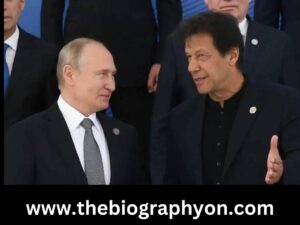
Imran Khan with Russian president Mr. Putin - Khan’s premiership faced immediate challenges, including economic woes, governance issues, and security concerns.
- His government initiated the Ehsaas Programme(a social safety net), the Kamyab Jawan Program (for youth empowerment), and the Plant for Pakistan
- Handling the COVID-19 pandemicand managing the economy were top priorities.
- Symbolic Significance:
- The first 100 days of Khan’s premiership held symbolic importance due to the PTI’s pre-election promise. It served as a benchmark to assess early success.
- Despite hurdles, Khan’s leadership style, charisma, and commitment to change left an indelible mark on Pakistan’s political landscape.
- During the 2018 Pakistani general election, Khan’s party, Pakistan Tehreek-e-Insaf (PTI), had unveiled an ambitious “100-day agenda”. This plan aimed to achieve several critical objectives:
At Present position of Imran Khan
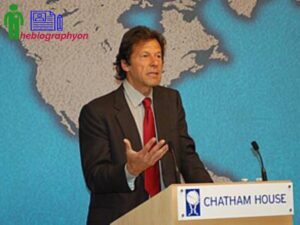
After his tenure as Pakistan’s Prime Minister, Imran Khan faced both triumphs and challenges. Here’s a succinct overview of his post-prime ministership phase:
- Legal Battles:
- Khan’s popularity remained intact despite over 150 legal casespending against him.
- His convictions for corruptionand selling state gifts dealt significant blows to his political standing.
- Ouster and Political Landscape:
- In April 2022, Khan was ousted from power through a no-confidence vote.
- His party, Pakistan Tehreek-e-Insaf (PTI), continued its political journey, but many PTI candidates were disqualified from the February 8, 2024 parliamentary elections.
- Struggle with Institutions:
- The struggle between civilian leaders and the powerful military persisted.
- Khan’s rapid convictions signaled that his rhetoric against institutions could prolong his time behind bars.
Read More “Bangabandhu“
Read More “Begum Zia“
Read More “Nelson Mandela“











